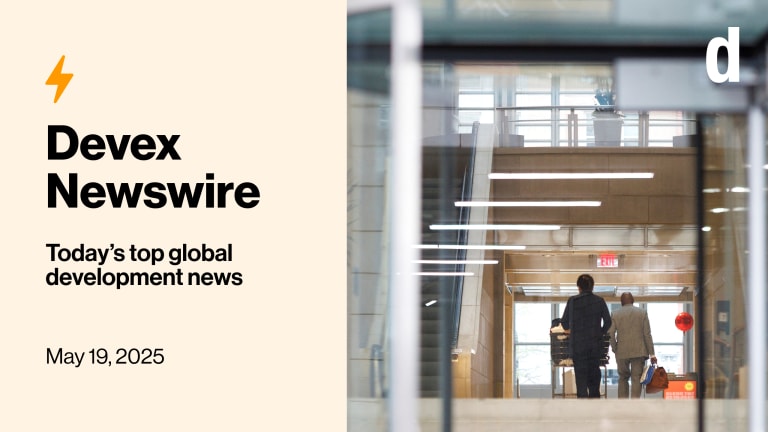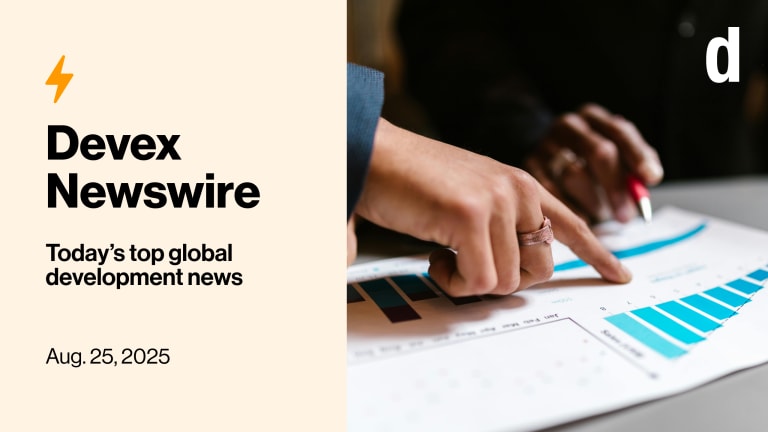
What you need to know from Davos and the World Health Assembly.
Today we also have readouts of the United Nation’s meeting on food and war, and the G-7 health ministers’ pandemic pact.
My colleague Adva Saldinger will be reporting from Davos this week. Here’s what she had to share:
This is a preview of Newswire
Sign up to this newsletter for an inside look at the biggest stories in global development, in your inbox daily.
Some things are new this year: bright sun, spring rains, a psychedelic house on the main drag where hundreds of side events are held. A building on the same street typically designated for the week as Russia House is this year dubbed Russian War Crimes House.

One thing I always look out for in the lead-up to Davos is an Oxfam report on inequality. In a “Profiting from Pain” report out Monday they help explain the growing inequality gap — while a new billionaire was created roughly every 30 hours during the pandemic, nearly a million people could be pushed into extreme poverty this year at nearly the same rate.
Food and energy billionaires have seen their fortunes rise by about $453 billion in the last two years — or about $1 billion every two days.
“With the fall-out from the Ukraine war piling the pressure on global food supplies — it’s clear that our systems are on life support,” says Jenny Ricks, the global convenor of the Fight Inequality Alliance. “But leaders’ increasingly out-of-touch policies that serve the rich and powerful jar with what for many, is a matter of survival. No one is looking to the ski slopes of Davos for the solutions — it is people on the front lines of inequality who have the answers.”
What are they calling for? Higher taxes on the richest individuals and corporations, jobs, and fair wages as part of protests in Kenya, South Africa, Switzerland, and the United Kingdom — where a group of millionaires joined in with the demand “tax us now.”
+ Want to know what to expect at Davos? If you haven’t tuned in yet, check out the first episode of the new podcast series Davos Dispatch, where Adva and Devex President Raj Kumar discuss what they expect from the World Economic Forum annual meetings this week.
Healthy debate
“Today, and every day, we have a choice. We make the choices. And today, and every day, we must choose health for peace, and peace for health.”
— Tedros Adhanom Ghebreyesus, director-general, World Health OrganizationIt’s a busy week. Just a five-hour train ride away from the glitz and glamor of Davos, my colleagues Jenny Lei Ravelo and Amruta Byatnal are in Geneva keeping a sharp eye on a critical World Health Assembly.
While Tedros’ reelection as head of WHO is a sure thing this week, there are many more open questions about reforming WHO and other parts of the global health architecture in response to COVID-19. And those debates are playing out against a violent backdrop — with WHO verifying 373 attacks on health care to date in 14 countries and territories that killed 154 health workers and patients in 2022.
‘I am a child of war’: WHO chief Tedros appeals for peace at WHA75
+ Join us for Devex @ WHA 75: On May 25, Devex will host a series of conversations with decision-makers, policy experts, and civil society activists to give you expert analysis and insider coverage of the week’s most important conversations. Can’t attend live? We’ll have a livestream. Register now.
A fair wage
More than 1 million female volunteers in India, known as Accredited Social Health Activists or ASHA workers, are among the six winners of the WHO director-general's Global Health Leaders awards announced Sunday. Sulakshana Nandi, co-chair of the People's Health Movement Global Steering Council, tells Amruta that this award is very timely as ASHA’s played a critical role during the COVID-19 pandemic but are still “considered as volunteers and are paid miserably.”
“Hopefully, with this world-wide recognition the Indian government will be compelled to recognise them as health workers and remunerate them adequately,” she says.
Foot the bill
An estimated 100,000 public health care facilities don’t have access to reliable electricity in sub-Saharan Africa and are considered risky customers by energy companies. Delegates at the Sustainable Energy for All Forum in Kigali last week said sustainable financing is needed to turn health facilities into appealing customers for the private sector.
SE4All: Turning health clinics into appealing customers to the energy sector (Pro)
+ Devex Pro subscribers can also read about the growing tension between energy access and tackling climate change. Not gone Pro yet? Sign up and start your 15-day free trial.
On the same page
Health ministers from the Group of Seven leading industrial nations adopted a pandemic pact during a two-day meeting in Berlin that ended on Friday, Andrew Green reports for Devex. The agreement aims to improve pandemic surveillance and identification systems globally and establish a mechanism for a swift, coordinated response.
Read: G-7 ministers adopt pandemic pact at 2-day meeting
Weapons of war
In a U.N. Security Council meeting convened by the U.S. Thursday, members called for an increase in financing to purchase food stocks and fund humanitarian operations, eliminate export bans of key commodities, and access to technical assistance to build resilient agriculture and food systems. Teresa Welsh has the readout.
Read: UN Security Council decries weaponized food crisis; Russia passes blame
Grim milestones
The U.N. Refugee Agency reported Monday that the number of people forced to flee conflict, violence, human rights violations, and persecution has surpassed 100 million for the first time in history.
“One hundred million is a stark figure — sobering and alarming in equal measure. It’s a record that should never have been set,” says U.N. High Commissioner for Refugees Filippo Grandi.
In other news
More than 60 are dead and millions are affected following heavy pre-monsoon rains that caused massive flooding and landslides in India and Bangladesh. [The New York Times]
UNHCR chief Filippo Grandi arrived in Bangladesh Saturday to meet with Rohingya refugees. [Arab News]
Newly sworn-in Australian Prime Minister Anthony Albanese will be in Tokyo to meet with counterparts from Quad, an Indo-Pacific strategic alliance comprising Australia, India, Japan, and the U.S. [Reuters]
Sign up to Newswire for an inside look at the biggest stories in global development.




